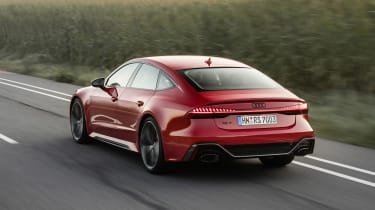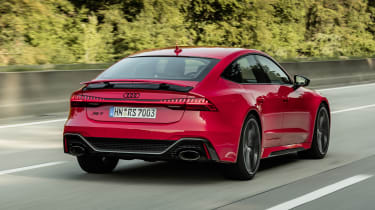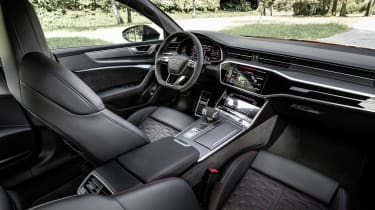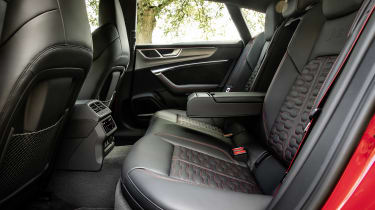Audi RS7 Sportback hatchback
"The Audi RS7 has a sensational engine and manages to be both very fast and very comfortable, but it isn't a true driver's car"
Pros
- Incredible engine
- Luxurious interior
- Appealing looks
Cons
- Expensive
- High running costs
- Steering still lacks feel
The Audi RS7 Sportback is a large luxury hatchback that blends big performance with an equally impressive interior, plus plenty of space and everyday usability. Under the bonnet is a 4.0-litre twin-turbo V8 petrol engine that now produces 592bhp - almost 40bhp more than the old model.
Whereas the RS7 used to share its V8 engine with the Audi S7 Sportback, the S7 now comes with a powerful diesel engine. There’s a bigger gap between the two cars as a result, and that goes some way to justifying the £20,000 or so extra you’ll need to pay if you want an RS7 instead of an S7.
Look at the two cars side-by-side and you’ll be left in no doubt as to which is the faster model. The RS7 has much wider wheel arches, complete with 21-inch alloy wheels, and the front end features gloss black trim instead of silver. It has a much more aggressive body kit, and there are new bumpers front and rear; the latter features two massive oval tailpipes, compared to the S7’s four smaller round exhaust finishers (which are actually fake).
The car is capable of 0-62mph in just 3.6 seconds and generates huge amounts of grip thanks in part to Audi’s famous quattro four-wheel-drive system. Top speed is limited to 155mph but, if you pay for one of the two Dynamic Packages, that increases to 174mph or 189mph. While it isn’t the last word in driver involvement, the RS7 is a great all-rounder, making a relaxed, comfortable and quiet cruiser when you want to serenely cover big distances.
While it won’t offer similar fuel economy to the diesel-powered S7, Audi has included a range of fuel-saving technology to make petrol bills slightly less painful. Under light throttle, four of the eight cylinders shut down and, when you take your foot off the accelerator, a 48V mild-hybrid system allows the engine to take a break. It’ll still be a thirsty car; you’ll be seeing MPG figures in the teens if you make use of the power available.
More reviews
Aside from the high fuel bills, there isn’t much to sour the experience of using the RS7 on a daily basis; it’s practical, comfortable and well built. The ride can occasionally feel a little firm, but given the RS7’s performance potential, the Audi doesn’t seem to require many sacrifices or compromises.
There aren’t many cars on the market exactly like the RS7, but prospective buyers may also want to consider the BMW M5 or a Porsche Panamera. Another rival will be Audi’s own RS6 Avant, which uses the same mechanical parts but will be slightly less expensive and more practical.
MPG, running costs & CO2
The RS7 has a large, powerful petrol engine and weighs just over two tonnes, so high fuel consumption is pretty much inevitable. According to official figures for the new RS7, it can return upto 23mpg - and you should be able to get close to this number in real driving, unlike the old car (its figures were measured using the outdated NEDC test cycle).
Audi has gone to great lengths to make the RS7 as efficient as possible. The V8 engine includes cylinder-on-demand technology, which allows the engine to run on half its cylinders if you’re not demanding much from the engine. When you coast or start to brake, the whole engine can shut down below a certain speed to save fuel. The petrol engine cuts in again instantly and almost imperceptibly.
Under the current VED (road tax) system, the car costs £465 a year in tax. This includes a flat amount of £145 plus a surcharge of £320 a year for the first five times you renew the tax because the car costs more than £40,000 to buy. While servicing should be priced similarly to the standard Audi A7, you can expect to pay more for consumables like tyres, brakes and oil.
Engines, drive & performance
The RS7 uses a twin turbo 4.0-litre V8 petrol engine that produces 592bhp. It’s a mighty engine, delivering a 0-62mph time of 3.6 seconds, which is even quicker than the Performance version of the old RS7.
As well as incredible acceleration, the engine in the RS7 also produces masses of pulling power very low down in the rev range, making overtaking and cruising effortless. V8 petrol engines are increasingly rare in today’s sports cars and the one in the RS7 sounds great at idle and when it’s being pushed hard.
While the engine is basically flawless, the RS7 is by no means perfect when it comes to driver engagement. The steering lacks feel and seems a little disconnected, but it is direct and is a big improvement over the old model. The ride is similarly improved, and it remained smooth and comfortable over the worst German tarmac we could find (although we’re yet to see how it fares on UK roads). A Drive Select system allows you to adjust the car’s setup, including the standard air suspension, depending on how you want to drive, while Audi has generally managed to disguise the car’s significant weight.
Alongside the adaptive suspension, four-wheel steering is standard on UK cars. This helps the car be more agile at lower speeds (the rear wheels turn slightly in the opposite direction to the front wheels) and more stable at higher speeds (the rear wheels turn the same way as the fronts). You can delve into the options list to add extra performance features: the two Dynamic Packages raise the top speed to 174mph and 189mph respectively, and ceramic brakes, sportier suspension and Dynamic Ride Control are all available.
Interior & comfort
The Audi RS7 delivers on the luxury you expect for a car nudging the £100,000 mark. A big part of that luxury is the RS7’s ‘Super Sports’ seats, which are heated and come with quilted leather upholstery, multi-way power adjustability and lumbar support. The sporty, flat-bottomed steering wheel is stitched in perforated leather and the dash is covered in tactile, high-quality materials. There are a few RS badges dotted around to remind you and your passengers that this is the flagship version. New RS graphics for the Virtual Cockpit have also been introduced.
Not only is the interior plush, but it’s also very quiet. The 4.0-litre V8 engine sounds great under hard acceleration, but its power means it’s also very unobtrusive when travelling it a constant cruise.
The standard version comes with 21-inch alloy wheels, HD Matrix LED headlights with laser technology, two touchscreen displays and RS sports seats. Upgrade to RS7 Carbon Black trim and 22-inch wheels are fitted, along with exterior trim in gloss black and Carbon Twill interior inlays.
Alternatively, the ultimate Vorsprung trim adds Dynamic Ride Control suspension, a panoramic glass sunroof and an increased top speed of 174mph.
Practicality & boot space
To seat people in the rear with the appropriate level of comfort and luxury, Audi has done away with the middle seat to make the RS7 a four-seater. You can choose to have a standard three-seat bench if you prefer; this is something Audi won’t offer in many of the countries in which the RS7 will be sold. Legroom is pretty good, and the headroom isn’t too bad considering the car’s coupe shape.
Although the RS7 lacks a middle seat as standard, it does benefit from useful extras such as a load-through hatch, ski bag and heat-insulating windscreen. Not only that, but at 535 litres, the boot is vast. It can be expanded to 1,390 litres with the rear seats folded, which is more spacious than the Porsche Panamera.
If you love the character of the RS7 but need something with more practicality, you may want to wait for the Audi RS6 Avant, which comes as an estate and is due in the first few months of 2020. It has the same engine, almost identical performance and is actually slightly cheaper to buy.
Reliability & safety
Sharing its engine and running gear with the Audi RS6 means parts in the Audi RS7 are already tried-and-tested, so there shouldn’t be any niggles or teething problems. Standard safety equipment is good and you can add lots of active safety kit as options. The RS7 doesn’t sell in sufficient numbers to have been crash-tested by Euro NCAP, nor does the A7 on which it’s based, but we’d expect the car to claim the full five stars if it was, given the scores of Audi models that have been assessed.
As a brand, Audi finished a middling 16th out of 30 manufacturers in our 2019 Driver Power owner satisfaction survey, with 21% of owners reporting a fault in the first year of ownership.















